Overview
The primary objective of this article is to present a structured methodology for selecting the optimal labeling service for nutraceuticals. It delineates five critical steps:
- Identifying unique needs
- Evaluating potential providers against essential criteria
- Assessing their capabilities
- Establishing effective communication
- Emphasizing that these elements are vital for ensuring compliance and enhancing product visibility in a competitive market.
Introduction
Navigating the complex landscape of nutraceutical labeling services presents a significant challenge for manufacturers seeking to ensure both compliance and market appeal. Labels function as crucial communication tools and regulatory necessities; thus, comprehending the intricacies of design, compliance, and printing is essential for success.
Critical factors can either make or break the selection of a labeling service. Companies must align their specific needs with the right provider to enhance brand visibility and foster consumer trust.
Understand Labeling Services for Nutraceuticals
Explore the essential labeling service options available for nutraceuticals, which encompass design, compliance, and printing. Labels serve not only as a method of identification but also as a crucial marketing instrument that conveys benefits and regulatory information. At Western Packaging, we specialize in tailored flexible packaging solutions that elevate your product's shelf appeal and brand recognition. Familiarize yourself with the types of labeling services available:
- Custom Label Design: Tailored designs reflecting your brand identity and appealing to your target audience, crafted with our innovative packaging design solutions. Successful examples include brands that have effectively utilized vibrant colors and clear messaging to attract health-conscious individuals.
- Regulatory Compliance: A labeling service that ensures labels meet FDA and FTC guidelines is vital for avoiding legal issues. Labels must accurately reflect item contents and health claims, fostering transparency and trust among buyers. As the nutraceutical market develops, the significance of compliance continues to grow, with data indicating that more than 70% of buyers emphasize clear labeling when making purchasing choices.
- Labeling Service: The options for various materials and finishes in our labeling service enhance visibility on shelves, ensuring your nutraceutical items stand out. Innovative printing methods, such as eco-friendly inks and textured finishes, can significantly influence buyer perception and brand loyalty.
By leveraging custom label design, ensuring regulatory compliance, and utilizing advanced printing solutions, nutraceutical companies can effectively communicate the value of their offerings and foster consumer trust.
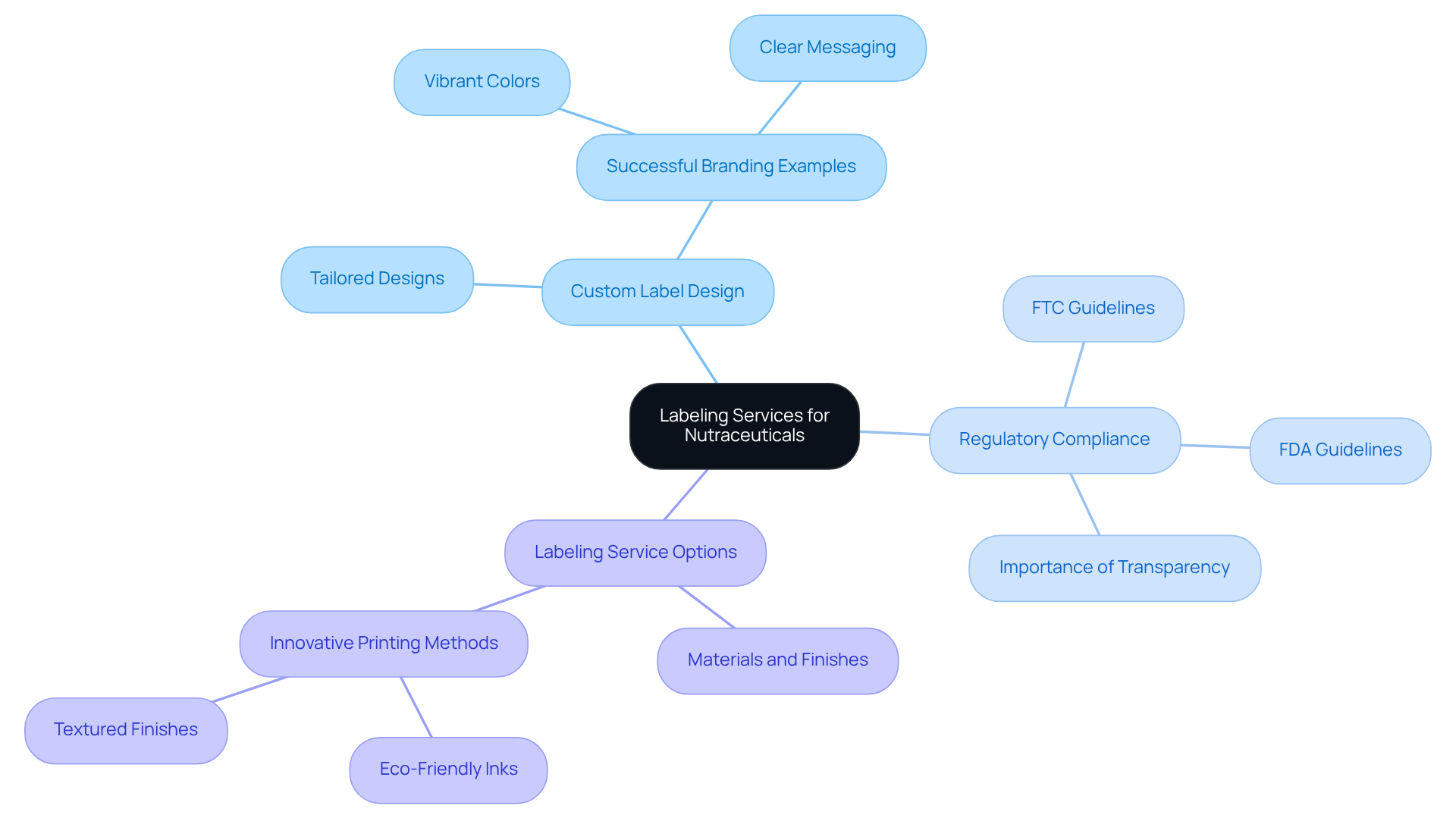
Identify Your Unique Labeling Needs and Challenges
Recognizing your specific tagging requirements and obstacles is essential before selecting a labeling service. Consider the following factors:
- Product Type: Different products, such as powders, gummies, or liquids, necessitate tailored labeling approaches to ensure clarity and compliance.
- Target Market: Understanding your audience's preferences and expectations can significantly influence design choices and messaging strategies.
- Regulatory Requirements: Acquaint yourself with particular regulations that oversee your product category, including marking mandates from the FDA and other authorities. For instance, the Nutrition Labeling and Education Act requires detailed nutritional information on labels, while recent laws prohibiting the sale of certain supplements to minors, effective April 2024, emphasize the need for compliance.
- Volume and Scalability: Evaluate your production volume and ensure that the labeling service can accommodate growth. As the nutraceuticals industry is projected to reach USD 417.66 billion by 2026, and with approximately 75% of Americans taking some form of dietary supplement, scalability is essential for meeting increasing demand.
- Allergen Identification: Precise allergen identification is vital for safety, necessitating clear recognition of allergens to safeguard individuals with allergies.
By clearly outlining these elements, you can effectively convey your needs to potential partners, ensuring that your items not only meet regulatory standards but also connect with consumers.
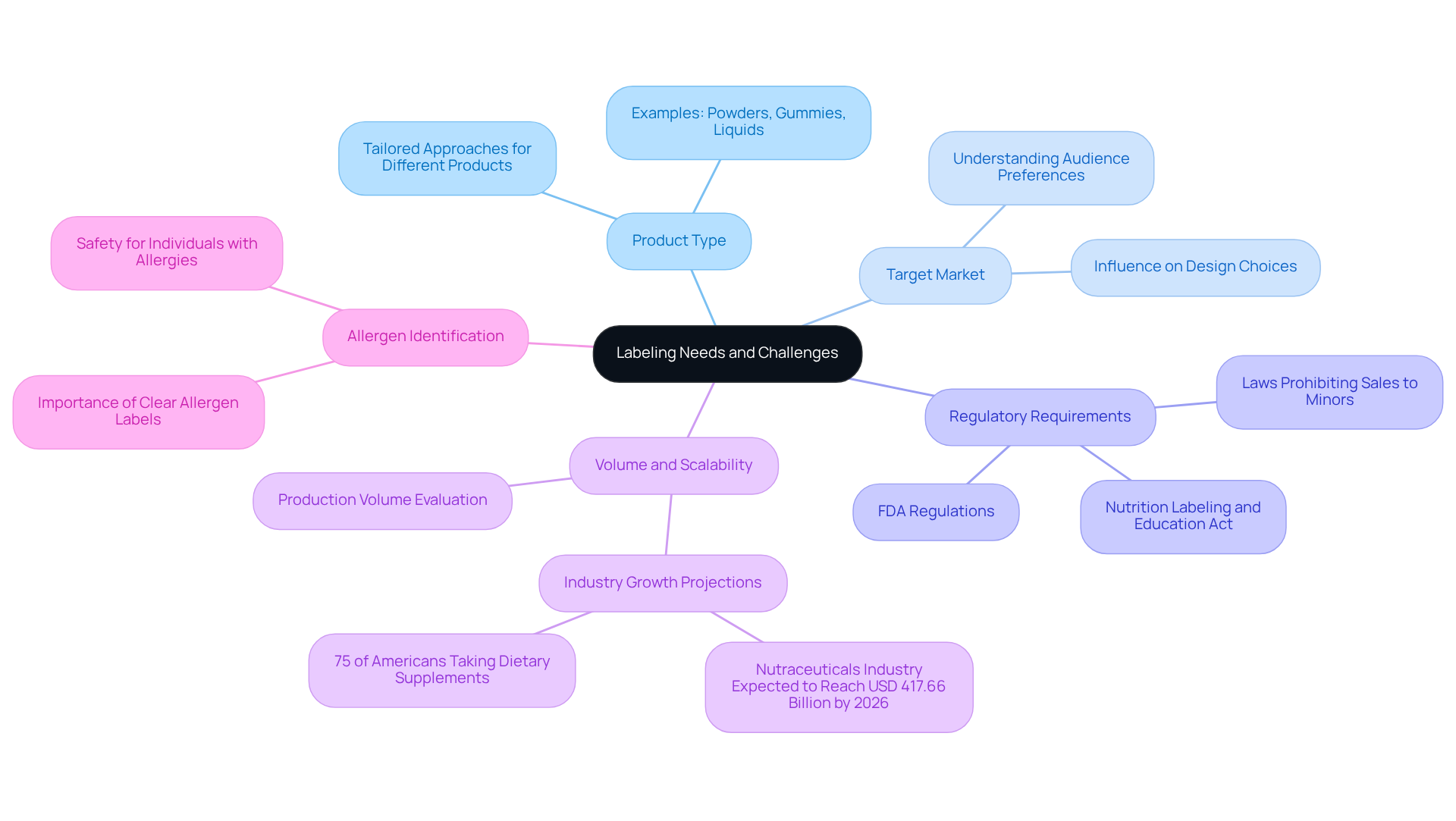
Evaluate Potential Labeling Services Based on Key Criteria
When evaluating potential labeling service options for nutraceuticals, it is essential to consider several key criteria that can significantly impact your product's success.
- Experience in Nutraceuticals: Prioritize providers with a solid track record in the nutraceutical sector. Their knowledge of industry regulations and trends guarantees adherence and significance in your branding.
- Design Capabilities: Assess their ability to create visually appealing and compliant designs. Effective labeling not only draws in buyers but also conveys important product information clearly. With the growing demand for plant-based supplements, aligning design capabilities with market trends is crucial.
- Technology and Equipment: Ensure that the offering utilizes modern printing technology. High-quality labels are crucial for maintaining brand integrity and meeting consumer expectations, especially in a market where approximately 70% of adults have used dietary supplements, highlighting the need for standout packaging.
- Customer Support: Evaluate their responsiveness and willingness to collaborate throughout the process. Strong customer support facilitates smoother communication and adjustments, ensuring that your specific needs are met.
As Peter Drucker wisely stated, "There is nothing so useless as doing efficiently that which should not be done at all." By using these criteria, you can effectively reduce your choices to those providers that offer a labeling service that aligns best with your requirements, ultimately enhancing your product's market presence and operational efficiency. Remember, as Will Durant noted, "We are what we repeatedly do. 'Excellence, then, is not an act but a habit," highlighting the significance of ongoing quality enhancement in identification processes.
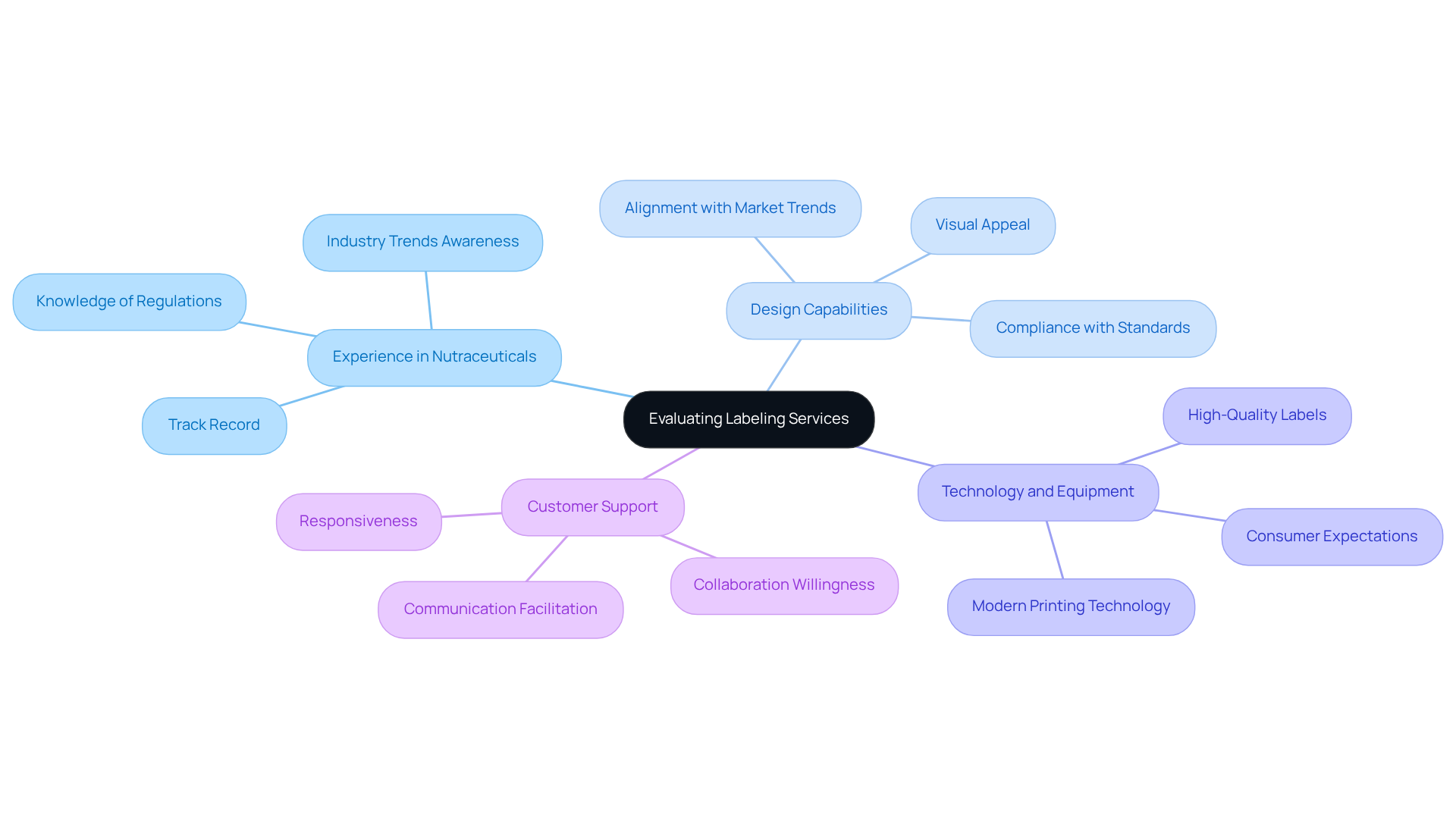
Assess Provider Capabilities and Track Record
When narrowing down your options for a labeling service, it is imperative to conduct a thorough evaluation of each provider's capabilities and track record.
- Portfolio Review: Begin by analyzing their previous work to assess design quality and compliance with industry standards. A robust portfolio is indicative of a provider's ability to deliver effective labeling service solutions tailored to your specific needs. As industry experts have noted, a well-curated portfolio significantly enhances trust in a provider's capabilities.
- Client Testimonials: Next, gather feedback from past clients to gain insights into their experiences. Statistics reveal that 92% of consumers read online reviews before making a purchase, underscoring the importance of testimonials in establishing trust. Positive testimonials can boost revenue by approximately 62%, making them a critical factor in your decision-making process. Marketing expert Krunal Vaghasiya asserts, "Testimonials help prove the credibility of your product, attracting more customers."
- Certifications: It is also essential to verify any relevant certifications that indicate adherence to industry standards. Certifications serve as a benchmark for quality and reliability in labeling services. Research indicates that businesses with recognized certifications are often perceived as more trustworthy by consumers.
- Case Studies: Lastly, seek out case studies that illustrate the provider's problem-solving capabilities and successful project outcomes. For instance, a case study may demonstrate how a provider effectively tackled a classification challenge for a nutraceutical product, showcasing their expertise and dependability. Such examples provide a clearer picture of how the provider has addressed challenges in the past.
This comprehensive evaluation will empower you to choose a provider that not only meets your particular needs but also boasts a proven track record of delivering quality outcomes.
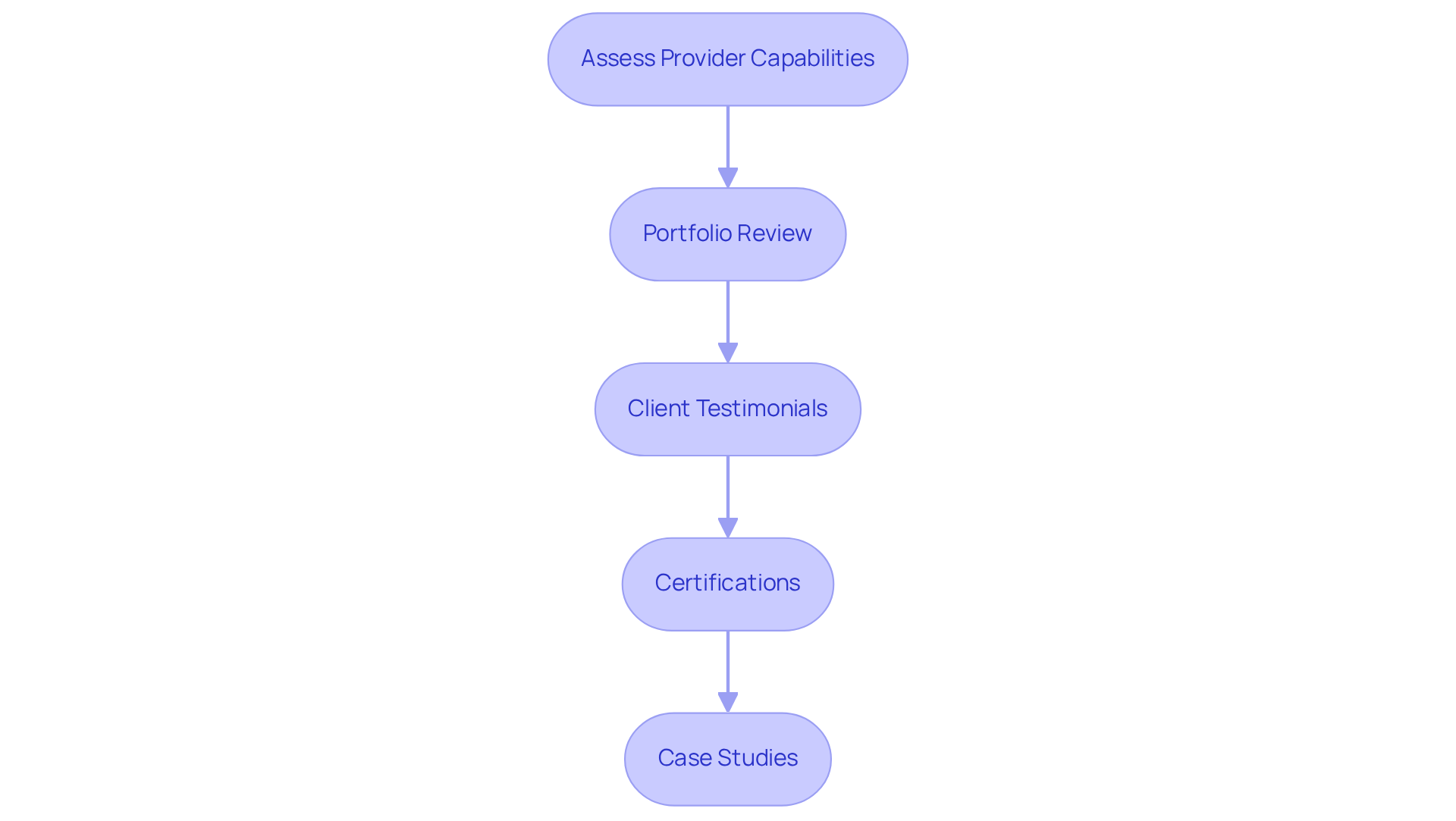
Establish Effective Communication with Your Labeling Partner
To ensure a successful partnership with your tagging service provider, establishing effective communication is crucial. Here are key steps to foster a productive partnership:
- Set Clear Expectations: Clearly outline your goals, timelines, and specific requirements. This clarity is essential, as 57% of global employers consider communication the most desirable skill in job candidates, highlighting its importance in professional relationships. Additionally, the cost of miscommunication in the workplace cost US businesses $1.2 trillion in 2022, underscoring the financial implications of poor communication.
- Regular Check-Ins: Schedule consistent updates to discuss progress and address any concerns. Regular meetings enhance communication by keeping all parties informed and engaged, which is vital for maintaining alignment. In fact, 75% of employers rate teamwork and collaboration as 'very important,' reinforcing the need for collaborative efforts in partnerships.
- Feedback Loop: Implement a system for providing and receiving feedback to refine designs and processes. This iterative approach not only improves outcomes but also fosters a culture of collaboration. As Nikita Sherbina states, "Effective communication, both internal and external, is the backbone of successful organizations."
- Documentation: Maintain thorough records of all communications and agreements to prevent misunderstandings. Effective documentation is a cornerstone of successful partnerships, ensuring that all parties are on the same page. Furthermore, it's important to recognize that 49% of on-site workers reported burnout due to digital communication, highlighting the need for clear communication practices to prevent such issues.
By prioritizing open communication and setting clear expectations, you can cultivate a strong partnership that leads to successful outcomes in labeling service.
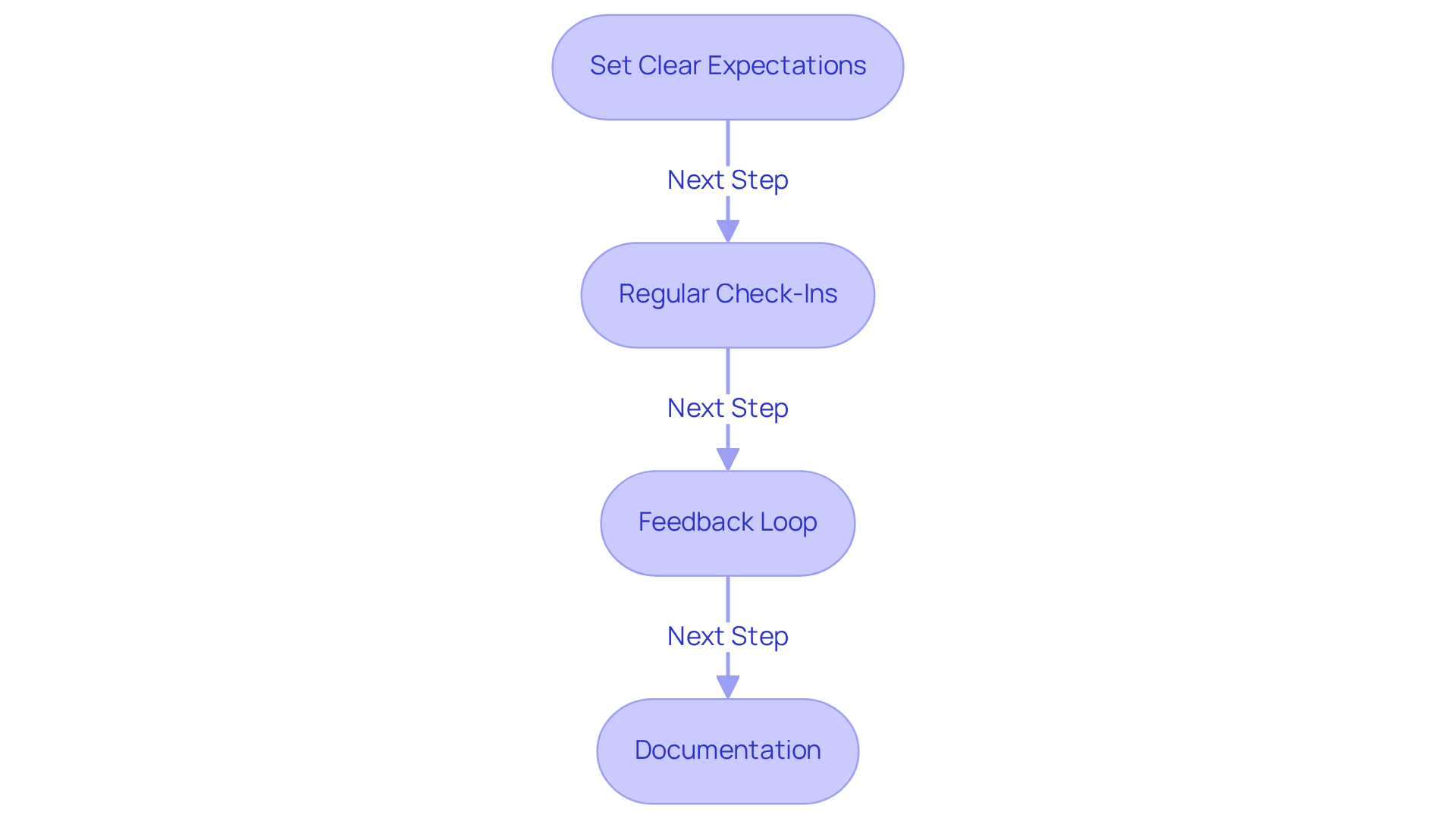
Conclusion
Choosing the right labeling service for nutraceuticals is a critical step in ensuring product success and consumer trust. Understanding the essential components of labeling services—including custom design, compliance with regulations, and advanced printing techniques—enables nutraceutical companies to effectively enhance their market presence. Selecting a service that aligns with unique product needs and challenges is crucial for creating labels that resonate with the target audience while adhering to industry standards.
This article outlines key considerations for evaluating labeling services, emphasizing the importance of:
- Experience
- Design capabilities
- Technology
- Customer support
A thorough assessment of potential providers, including portfolio reviews, client testimonials, and certifications, can significantly influence the decision-making process. Establishing effective communication with the chosen labeling partner through clear expectations and regular updates further ensures that the collaboration yields successful outcomes.
In a rapidly growing nutraceutical market, prioritizing quality labeling services is imperative. As consumer preferences shift and regulatory landscapes evolve, companies must remain proactive in their labeling strategies to foster trust and brand loyalty. By following these guidelines, businesses can navigate the complexities of labeling and leverage it as a powerful tool for marketing and compliance, ultimately leading to greater success in the nutraceutical industry.
Frequently Asked Questions
What are the key labeling services available for nutraceuticals?
Key labeling services for nutraceuticals include custom label design, regulatory compliance, and various labeling options that enhance visibility and appeal.
Why is custom label design important for nutraceuticals?
Custom label design is important because it reflects brand identity and appeals to the target audience, using vibrant colors and clear messaging to attract health-conscious consumers.
What does regulatory compliance in labeling entail?
Regulatory compliance in labeling ensures that labels meet FDA and FTC guidelines, accurately reflect item contents and health claims, and foster transparency and trust among buyers.
How does labeling impact consumer purchasing decisions?
Labeling significantly impacts consumer purchasing decisions, with data indicating that more than 70% of buyers prioritize clear labeling when making choices.
What factors should be considered when identifying unique labeling needs?
Factors to consider include product type, target market, regulatory requirements, production volume and scalability, and allergen identification.
How does product type influence labeling approaches?
Different product types, such as powders, gummies, or liquids, require tailored labeling approaches to ensure clarity and compliance with regulations.
Why is understanding the target market important for labeling?
Understanding the target market's preferences and expectations influences design choices and messaging strategies, ensuring the label resonates with consumers.
What regulatory requirements must nutraceutical labels comply with?
Nutraceutical labels must comply with regulations such as the Nutrition Labeling and Education Act, which requires detailed nutritional information, and recent laws prohibiting the sale of certain supplements to minors.
Why is scalability important for labeling services in the nutraceutical industry?
Scalability is important because the nutraceutical industry is projected to grow significantly, and labeling services must accommodate increasing production volumes to meet demand.
What is the significance of allergen identification on labels?
Allergen identification is vital for safety, as it ensures clear recognition of allergens to protect individuals with allergies.




